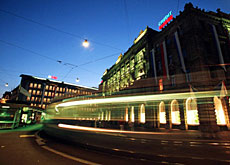Hunt for dirty money turns professional

Switzerland has launched a new centre to keep police, prosecutors and bankers up to date on the latest trends in white-collar crime.
Just as the spectrum of financial crime has widened in recent years, so has the need for specialised training among crime fighters.
Two years ago, the Lucerne Business School opened Switzerland’s first executive masters course in “economic crime investigation”.
The same course is also offered in French at the Neuchâtel higher school of management in western Switzerland.
Following the recent graduation of its first 43 students, the school has now become home to Switzerland’s only institute – or “competence centre” – for forensics and economic crime.
The newly formed centre is a key element in Switzerland’s increasingly formalised approach to economic crime.
Spurred on in part by criticism from abroad, the country has tightened up its laws to crack down on money laundering, fraud and bribery.
In turn, this has fuelled demand for well-trained professionals schooled in tracking and prosecuting white-collar criminals.
“Economic criminals have special skills,” Adrian Lobsiger, head of the executive masters course told swissinfo.
“And if we want to understand and investigate this special form of crime, we have to educate our people and give them the same skills,” he said.
Private sector sleuths
Study areas include law, economics and computer forensics.
Students from last year’s course covered issues such as the misuse of remuneration by executives, credit fraud, tax evasion, e-mail crime, economic espionage and even money laundering within professional football.
Although the course is aimed at professionals from government agencies, Lobsiger said the private sector is equally interested.
“In our first classes we had a good mix of people from private enterprise and the state bodies,” Lobsiger said.
“We had people coming from banks, insurance companies, auditors and also law firms.”
Switzerland’s financial institutions are increasingly playing a more crucial role in the detection of economic crime and dirty money.
“Know your customer” rules as well as reporting requirements for banks that accept deposits from prominent politicians – so-called “politically exposed persons” – mean businesses are obliged to maintain detailed data-bases and install electronic systems capable of detecting illegal funds.
Switzerland’s biggest bank, UBS, keeps a list of some 200,000 names from around the world of prominent politicians, their families and associates.
Reputation at risk
Lobsiger said Switzerland has little choice but to boost its resistance to white collar crime, given its dependence on an often-battered reputation for financial probity.
“Our financial system is worried about [its] reputation,” Lobsiger said.
“Companies want to contribute to the good reputation here, which is why many people in private enterprise are working to deal with prevention of crime, compliance services and auditing.”
Susanne Pälmke, a federal prosecutor and recent graduate of the Masters course, told swissinfo that the course enabled her to up-date her skills.
“I’m very interested in fighting or investigating economic crime and I knew I didn’t have enough knowledge to do it properly,” Pälmke said.
“I studied law at the university of Zurich [more than 12 years ago] and economic crime was not the main subject in our studies,” she added.
New challenges
Although the course and its associated competence centre help boost Switzerland’s efforts to fight economic crime, questions remain about whether authorities are capable of prosecuting crimes that cross national boundaries.
The Internet, as well as globalisation in general, has created new opportunities for criminals, who often use techniques that take years to come to light.
“You will always be behind and of course criminals have increasing skills,” said Lobsiger. “But I think ours are increasing as well.”
Both Lobsiger and Pälmke acknowledged the difficulty of predicting the “next big thing” when it comes to economic crime.
While the current vogue is hunting for money launderers or terrorists, tomorrow’s focus may be on organised computer crime.
By the book
Lobsiger said laws against economic crimes were becoming more consistent throughout the world.
“We will arrive at a point where legal differences will vanish. It’s perhaps more important in the long term to enact and execute all these rules and regulations.
“And knowing the character of the Swiss banker or civil servant or prosecutor, I would say it’s our tradition to observe rules in our daily practice.”
Although other countries devote resources to training police and prosecutors in fighting economic crime, Lobsiger suspects the Swiss school is unique.
“We use the help of universities and work with professors, but the core of our teaching body are practitioners. A school like that I’ve never seen,” he said.
swissinfo, Jacob Greber in Zurich

In compliance with the JTI standards
More: SWI swissinfo.ch certified by the Journalism Trust Initiative











You can find an overview of ongoing debates with our journalists here . Please join us!
If you want to start a conversation about a topic raised in this article or want to report factual errors, email us at english@swissinfo.ch.